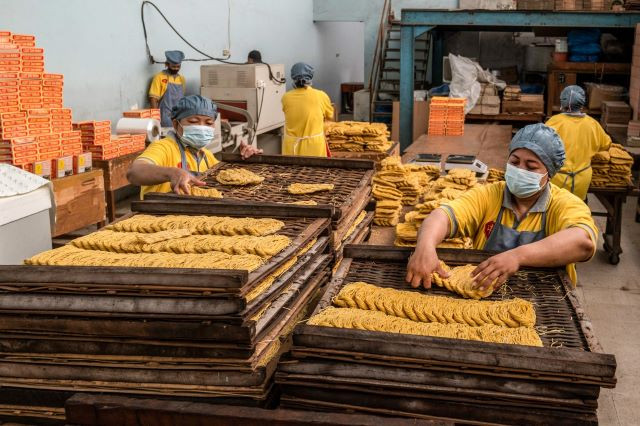Popular Reads
Top Results
Can't find what you're looking for?
View all search resultsPopular Reads
Top Results
Can't find what you're looking for?
View all search resultsReleasing young voices
Banding together: Some of these young men hope to make a living out of the music industry after learning how to write and perform their own music while in detention
Change text size
Gift Premium Articles
to Anyone

B
span class="caption">Banding together: Some of these young men hope to make a living out of the music industry after learning how to write and perform their own music while in detention.
It is not just stomachs that feel hunger, but hearts as well. That is the belief of Karangasem Juvenile Penitentiary director Haryoto who feeds his kids' souls with music.
Netherlands-based foundation OneDollarForMusic (ODFM) has been bringing art and music to juveniles in detention in Karangasem, eastern Bali, since 2013. The foundation founder, Raoul Wijffels sees the program as a 'Trojan Horse' mechanism, in which young men develop teamwork and social skills via the arts.
'In painting we have the kids work together on one painting; they need to talk with each other so that helps them to open up. In music, again they are working as a team, learning to listen to others and through that learning they also have a voice, hence the name of the program Young Voices ' Released,' said Raoul of the program that consistently achieves 100 percent attendance by the 26 young men in the prison.
Over the last two years 60 youths have been helped by Raoul's program, which with Law and Human Rights Ministry support, is set to go national across Lombok, Bali, Central and East Java soon.
The project, funded by the Dutch organization, the Interchurch Cooperative for Development Cooperation International, has the full support of veteran prison officer, Haryoto, who took over the reins at the juvenile prison six months ago, inheriting the music and arts program.
The program, Haryoto said, is as vital to young inmates' rehabilitation as a healthy diet, clean living spaces and an understanding of the common interreligious rule, 'do unto all men as you would wish to have done unto you,' as noted by Hadith gatherer Abu Dawud.
'Prisoners need food for the stomach, but they also need music, the arts and life skills for the soul and for their futures,' said Haryoto, adding that juvenile offenders also undertake religious studies to help juvenile offenders understand the real meanings of right and wrong.
'The main activities we do are for spiritual growth because people learn calmness through the heart, patience is from the heart and kids here, their hearts are closed and they have burdens, so we share religion and I give advice so they can see how to solve problems spiritually, how to make positive action and make life better,' said Haryoto, adding that music and arts are an essential element in this spiritual development.

Recidivism of young offenders can be drastically reduced through arts, life skills and religious training hopes Haryoto, who said he dreads the thought of any of his 'children' ever being sent to adult prison after their release.
'Adults do crime for their kids and other reasons, and I can understand that, but when kids are in jail it is worse and if they returned to jail as adults I would feel I had failed them. So this is the challenge, to help these kids'¦. [who] I hope never commit a crime again. Yes, adults keep coming back to prison, but my hope is these kids never come back to jail again,' said Haryoto.
He stressed that through the ODFM arts program 'children can understand that art can change their character. With Raoul's help their behavior can change.'
For the young men whose voices have been released on a CD of their original songs, Free Voices From Behind Bars, there is a great pride and with their paintings on the walls of the prison hall and regular jam sessions with respected musicians, self-belief and faith in the future is developing.
For a 21-year-old from Jember, East Java, learning teamwork and trust through arts and music has improved his faith in the future.

'I am in here for stealing cars, I was poor so I stole. I am hoping for a better future. I want to work in catfish farming and I have learned through this program that to succeed, people need to work together,' said the young man.
Plans to become a mechanic on his release have altered the life course of one 18-year-old from Lombok. 'I get out in two months and I want to make my parents happy again. I hope to work as a mechanic, a skill I learned here in prison,' he said.
A Balinese 15-year-old, who is in prison for motorcycle theft, said that the ODFM program is 'cool' and has inspired him to return to school upon his release.
'I have one month to go. I want to leave and go back to school. Being here I have learned to understand right and wrong in life and to know that I still have much to learn,' said one of the prison's youngest inmates.
One of the ODFM program's brightest stars was due for release at the time of this interview. Since joining the arts activities, the young man has developed poetry and song-writing skills and has plans to head to Java to continue his studies.
'Before I came here I could not play guitar, now I am playing and writing and I have discovered a person can do wrong and still become good and have success in their lives. I know now if you work hard, you can win,' said the 20-year-old, who has found new skills and confidence in his future through music, arts and literature.
' Photos by JB Djwan









